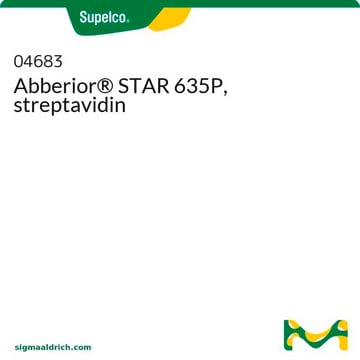41699
Anti-Rabbit IgG−Abberior® STAR RED antibody produced in goat
for STED application
Sinonimo/i:
Abberior® STAR RED-Anti-Rabbit IgG antibody produced in goat
About This Item
Prodotti consigliati
Origine biologica
goat
Forma dell’anticorpo
affinity isolated antibody
Tipo di anticorpo
secondary antibodies
Clone
polyclonal
Forma fisica
buffered aqueous solution
Reattività contro le specie
rabbit
Concentrazione
~1 mg/mL
Fluorescenza
λex 638 nm; λem 655 nm in PBS, pH 7.4
Temperatura di conservazione
−20°C
Descrizione generale
Photophysical properties (carboxylic acid):
Absorption Maximum, λex [nm]: 638 (PBS pH 7.4), 638 (H2O), 634 (MeOH)
Extinction Coefficient, εmax [M-1cm-1]: 120 000 (PBS pH 7.4), 125 000 (H2O), 115 000 (MeOH)
Correction Factor, CF260 = ε260/εmax: 0,16 (PBS pH 7.4)
Correction Factor, CF280 = ε280/εmax: 0,32 (PBS pH 7.4)
Fluorescence Maximum, λem [nm]: 655 (PBS pH 7.4), 655 (H2O), 654 (MeOH)
Recommended STED Wavelength, λ [nm]: 750-800
Fluorescence Quantum Yield, λ: 0,90 (PBS pH 7.4)
Fluorescence Lifetime, τ [ns]: 3,4 (PBS pH 7.4)
Caratteristiche e vantaggi
- Unmatched, background free STED imaging cont
- Verified in Abberior Instruments and Leica STED microscopes
Compatibilità
Risultati analitici
unconjugated dye ≤5% of total fluorescence
Altre note
Note legali
Non trovi il prodotto giusto?
Prova il nostro Motore di ricerca dei prodotti.
Prodotti correlati
Codice della classe di stoccaggio
12 - Non Combustible Liquids
Classe di pericolosità dell'acqua (WGK)
WGK 3
Punto d’infiammabilità (°F)
Not applicable
Punto d’infiammabilità (°C)
Not applicable
Certificati d'analisi (COA)
Cerca il Certificati d'analisi (COA) digitando il numero di lotto/batch corrispondente. I numeri di lotto o di batch sono stampati sull'etichetta dei prodotti dopo la parola ‘Lotto’ o ‘Batch’.
Possiedi già questo prodotto?
I documenti relativi ai prodotti acquistati recentemente sono disponibili nell’Archivio dei documenti.
Il team dei nostri ricercatori vanta grande esperienza in tutte le aree della ricerca quali Life Science, scienza dei materiali, sintesi chimica, cromatografia, discipline analitiche, ecc..
Contatta l'Assistenza Tecnica.





